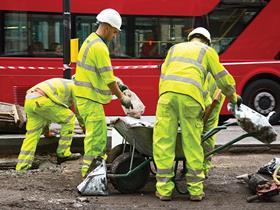With less than a week to go until the election, and all parties having finally published their manifestos, how do the parties line up on the key issues for construction?

Here, we measures each partyŌĆÖs commitments against the aims of our Agenda 15 manifesto - and with the likelihood of a coalition very much on the cards, looks at where there might be room for negotiation. Elsewhere online representatives of the Conservatives, the Green Party and UKIP are the latest to send open letters to the industry. And we ask our panel of floating voters to declare their intentions so far ŌĆ”

PLEDGE: Create an independent infrastructure body, either by implementation of the Armitt Review, or by building on existing structures, to assess and enable prioritisation of the UKŌĆÖs infrastructure needs. Appoint a cabinet minister responsible for overseeing the creation and implementation of the resultant infrastructure plan.

CONSERVATIVES
No mention of any new institutional arrangements to boost infrastructure but a pledge to increase capital spending on infrastructure, at least in line with growth in national income. Plan to invest over ┬Ż100bn to deliver the governmentŌĆÖs national infrastructure plan over the next parliament, including support for new garden cities. New cabinet post to promote infrastructure unlikely though, given the Conservatives are understood to be keen to save money by pruning the number of Whitehall departments.
LABOUR
Commitment to set up an independent National Infrastructure Commission, which is in line with the Armitt review that the party established. However, no mention of any move to create a dedicated cabinet post as the industry has called for. On specific areas of infrastructure, the manifesto pledges to continue support for the construction of HS2, expand rail links across the North and support long-term investment for strategic roads.
LIBERAL DEMOCRATS
Committed to ensuring that infrastructure investment, including housing and energy efficiency, continues to rise in absolute terms and as a share of the economy. Infrastructure investment is designed to underpin the Liberal DemocratsŌĆÖ commitment to promote growth across the UK and halve energy demand by 2050.
UKIP
The party blames immigration for piling pressure on existing infrastructure. Pledge to scrap the HS2 railway line and invest more in rail links between the NorthŌĆÖs main cities, while reopening KentŌĆÖs Manston Airport to ease air capacity constraints in the South-east.
GREENS
Little mention of infrastructure, beyond a national green infrastructure plan to promote energy efficiency. However manifesto promises to prioritise public over private transport as well as phase out all nuclear power within the next 10 years in favour of renewable energy.
ROOM FOR NEGOTIATION?
All three main parties pay lip service at least to efforts to improve infrastructure. However, Labour has few allies for its Agenda 15-backed proposal to create a National Infrastructure Commission. It could have more luck wooing the Liberal Democrats on infrastructure spending though. Both parties have pledged to continue borrowing during the next parliament to finance capital spending.

PLEDGE: Reinstate a realistic national housing target of at least 200,000 homes a year, and draw up a genuine implementation plan to meet it.
CONSERVATIVES
No target for overall housing numbers, but a pledge to build 200,000 quality starter homes over the course of the next parliament, which will be reserved for first-time buyers under 40 and sold at 20% below market price. Also, commitment to deliver 275,000 additional affordable homes and 10,000 homes to rent at below market rates by 2020. In addition, commitment to double the number of custom-built and self-built homes by 2020, which will be facilitated by a new right to build policy, under which councils will be required to allocate land to local people who want to build or commission their own home. New garden cities will be supported and housing zones will be created for 95,000 homes on brownfield sites.
LABOUR
Set a target of at least 200,000 homes a year by 2020. This will be achieved by implementing the recommendations of the Lyons Review, such as backing small housebuilders via a help to build scheme, prioritising capital investment for public sector housing by reforming the council housing finance system, and starting work on the construction of a new generation of garden cities. In addition, funds saved in the recently announced help to buy ISA accounts would have to be invested in increased housing supply.
LIBERAL DEMOCRATS
Set a target to increase the rate of housebuilding to 300,000 a year - the most ambitious from any political party. Thousands of these units will be delivered in ten new garden cities. This will involve setting the Homes and Communities Agency an ŌĆ£ambitious targetŌĆØ for development on unwanted public sector sites and establishing a government-backed Housing Investment Bank to provide long-term capital for major new settlements and attract finance for housebuilding projects. Government agencies to directly commission homes where the private sector is not delivering sufficient provision.
UKIP
Promises to free local authorities from government-imposed minimum housing numbers, but says that up to 2.5 million new homes can be developed on brownfield sites. However, their manifesto says that the UK cannot ŌĆ£build its way out of the housing crisisŌĆØ, demand for which can be cut by more effective control over immigration to the UK.
GREENS
No target for overall housing but one to provide 500,000 social rented homes, built to high sustainability standards, increasing the social housing budget from ┬Ż1.5bn a year to ┬Ż6bn a year in the lifetime of the parliament.
ROOM FOR NEGOTIATION?
All major UK-wide parties, with the exception of UKIP, have pledged to boost housing supply during the next parliament, suggesting plenty of scope for post-election deal-making on this issue. Labour and Liberal Democrats in particular are engaged in a bidding war on new residential construction.

PLEDGE: Set up a new national retrofit programme to improve the sustainability of homes and offices. Give the independent infrastructure body the remit to oversee drawing up the retrofit programme, the housing target, and assessing ŌĆ£nationally significantŌĆØ housing projects of above 5,000 homes - with the cabinet minister responsible for implementation of these objectives.

CONSERVATIVES
Support for low-cost measures on energy efficiency, setting a goal of insulating a million more homes over the next five years. However, no other mention of how this will be delivered.
LABOUR
Will offer a million interest-free loans for energy home improvements in the next parliament and make 200,000 homes warm every year. The entire privately rented sector will have to meet a decency standard, including having to meet energy efficiency measures.
LIBERAL DEMOCRATS
Improve energy efficiency of at least 4 million homes by 2020. Green ║┌Č┤╔ńŪ°s Act to set targets, including ambition for every home to reach at least an energy rating of B and C by 2035. Incentives to stimulate investment in energy efficiency, including council tax reduction of at least ┬Ż100 for 10 years, when the residentŌĆÖs home has achieved an energy saving improvement of at least two bands. Establish ŌĆ£feed out tariffŌĆØ for investment in solid wall insulation.
UKIP
No mention of this issue, perhaps reflecting the wider partyŌĆÖs extreme scepticism on climate change.
GREENS
Invest ┬Ż45bn in a nationwide retrofit insulation programme, concentrating on areas where fuel poverty is most serious, in a bid to bring 9 million homes up to the Passivhaus energy efficiency standard by 2020. Householders will be offered up to ┬Ż5,000 worth of free insulation, or other energy improvements such as solar photovoltaics if their home insulation is already up to Passivhaus standard. The Green Investment Bank will also be able to offer ┬Ż15,000 in subsidised loans for each dwelling for further improvements.
ROOM FOR NEGOTIATION?
The Liberal Democrats have outlined a far more detailed and radical package of measures on improving the built environmentŌĆÖs energy performance than either Labour or the Conservatives. The Green ║┌Č┤╔ńŪ°s Act is one of the pieces of environmental legislation which the party has identified as one of its five priorities in any coalition negotiation.

PLEDGE: Back industryŌĆÖs efforts to train up the next generation of construction workers by confirming support for the industry levy and making a mandatory requirement for training or apprentices on all public contracts over the OJEU threshold (currently ┬Ż4.3m).

CONSERVATIVES
Pledge to create 3 million new apprenticeships over the course of the next parliament, building on the 2.2 million delivered since 2010 by the coalition government. Employers will no longer have to pay national insurance contribution on apprentices under the age of 35 from next year.
LABOUR
Guarantee to provide an apprenticeship for every school leaver with the grades. This will partly be achieved by creating thousands more apprenticeships in the public sector, including the civil service. In addition, all firms getting major government contracts will be required to offer apprenticeships, making Labour the only party to back this aspect of Agenda 15. The same requirement will apply to large employers hiring skilled workers from outside the EU. Employers will gain more control over apprenticeships funding and standards, in return they will be asked to increase numbers of apprenticeships in their sectors and supply chains, with powers to deal with any free-riding employers who do not train.
LIBERAL DEMOCRATS
Pledge to both increase the number and improve the quality of apprenticeships, extending the apprenticeship grant for employers for the remainder of the next parliament, to deliver 200,000 grants to companies. Also, pledge to expand the number of degree-equivalent higher apprenticeships.
UKIP
Instead of four non-core GCSEs, pupils under the age of 16 will instead be able to take apprenticeship qualifications, which they could then continue past the minimum school leaving age.
GREENS
Provide an apprenticeship to all qualifying young people aged 16-25 who do not have one and want one. The governmentŌĆÖs duty to provide an apprenticeship to all qualifying young people aged 16-19, who do not have one, will be reinstated and extended to the age of 25. Funding for apprenticeships will be increased by 30%.
ROOM FOR NEGOTIATION?
Apprenticeships are flavour of the month in Westminster, with all parties committed to supporting efforts to promote structured, on-the-job training.

PLEDGE: Build on the progress achieved through publication of the government construction pipeline in providing greater workload certainty through expanded and ring-fenced government programmes of school building, social housing construction, and maintenance of the health estate.
CONSERVATIVES
Pledge to cut government spending, including capital investment, to bring government budget back into surplus before the end of the next parliament. However, the manifesto promises to open at least 500 new free schools over the course of the next parliament. Education funding to increase in line with growth in pupil numbers. NHS spending in England to increase in real terms by a minimum of ┬Ż8bn over the next five years.
LABOUR
Capital investment to be exempt from overall target to bring public spending back into balance by the end of the next parliament. Health and education spending will also both be protected in line with inflation. However, extra funds raised from mansion tax have been earmarked for extra nurses rather than new facilities.
LIBERAL DEMOCRATS
Like Labour, have committed to safeguard capital investment from squeeze on public spending during next parliament. Promise to protect education budget in real terms, but identified extra funding will be prioritised on free school meals to all pupils rather than facilities. NHS spending to be protected against increase in inflation until 2017/18 and from then to increase in line with economic growth, meaning health funding in England will be at least ┬Ż8bn higher a year in real terms by 2020.
UKIP
No specific promises on capital spending, but partyŌĆÖs hard line on deficit reduction suggests capital spending on public services will rank low on its list of priorities.
GREENS
Restore education capital funding to 2010 levels in real terms. Provide 500,000 social rented homes by quadrupling the social housing budget from ┬Ż1.5bn a year to ┬Ż6bn a year over the lifetime of the parliament. No new private finance initiative projects to be started, although local authorities will be set free to borrow to fund local capital investment in social housing.
ROOM FOR NEGOTIATION?
Labour and Liberal Democrat plans for greater slack on deficit reduction mean there is greater scope for post-election haggling on investment in bringing built education, housing and health estates up to scratch.

PLEDGE: Pursue a broad economic programme designed to create a thriving economy which benefits from greater regional and local devolution, and commit to making the case strongly for remaining within the EU in any forthcoming referendum on UK membership.

CONSERVATIVES
Promise to hold an in/out EU referendum following a renegotiation of the terms of the UKŌĆÖs continued membership. Conservatives would campaign to remain EU members if more favourable terms can be secured. Commitment to expand the single market, breaking down remaining barriers to trade and opening up new sectors to British firms. Devolve far-reaching powers over economic development and transport to large cities which opt for elected mayors, starting with Greater Manchester. Pilot project to allow councils to retain all additional business rates resulting from growth and devolve further powers over skills spending and planning to the mayor of London.
LABOUR
Opposes Conservative plans for an in/out referendum on UK membership of the EU on the basis that it is a costly distraction that will undermine confidence in the UK as a location for inward investment. However, pledge on legislation to prevent further transfer of powers to the EU without the consent of the British people. Pledge to devolve powers to English urban and county authorities as well as to Scotland and Wales. An English Devolution Act would transfer ┬Ż30bn of funding to city and county regions, along with powers over economic development, skills, employment, housing, business support and transport.
LIBERAL DEMOCRATS
The most pro-European of the Westminster parties has said it would support an in/out referendum on any treaty change involving a material transfer of sovereignty from the UK to the EU, in which it would campaign to stay in. Greater devolution of economic decision-making to local authorities and local enterprise partnerships. Transfer of powers over transport, housing and infrastructure funding and skills training would be prioritised. This is not a ŌĆ£one-size-fits-allŌĆØ approach and will be in response to demands from local councils.
UKIP
Withdrawal from the EU is the main plank of the UKIP policy. Support for local authorities having greater control over issues like planning but no mention of devolution of economic development functions, like transport, to local or regional bodies.
GREENS
Support for an in/out EU referendum on the basis that the institution has changed so much since the last vote on the UKŌĆÖs membership in 1974. However, Greens support the UKŌĆÖs continued membership of the EU. Greater devolution, including tax-raising powers for local authorities but, unlike the three main Westminster parties, no mention of moves to create strategic arrangements that more closely reflect economic activity.
ROOM FOR NEGOTIATION?
The ConservativesŌĆÖ proposed EU referendum represents a real dividing line between it and the other two major Westminster parties. However, Liberal Democrat leader Nick Clegg has not included the mooted vote in his list of priority issues when negotiating to form a government. On devolution to local government by contrast, the differences between the major parties are over pace rather than whether it should happen.



























No comments yet